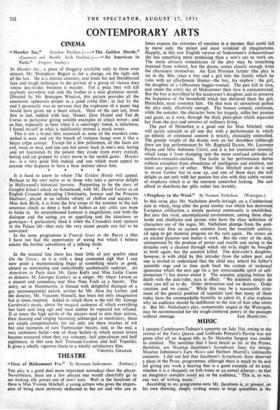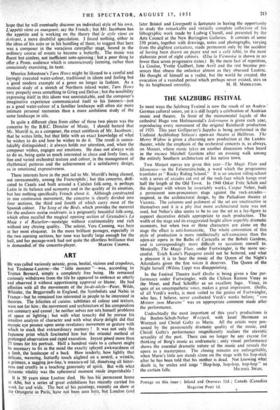MUSIC MISSED Castelnuovo-Tedesco's concerto on July 31st, owing to the
revival of the Fairy Queen, and Goffredo Petrassi's Partita was not given after all on August 6th, as Sir Malcolm Sargent was unable to conduct. The novelties that I have heard so far at the Proms, therefore, are Maurice Jacobson's Symphonic Suite for strings, Maurice Johnstone's Tarn Hows and Herbert Murrill's violoncello concerto. I did not feel that Jacobson's Symphonic Suite deserved a place in the Prom. programmes, although there is much to be said for giving any work a hearing that is a good example of its kind, whether it is a rhapsody on -folk-tunes or an atonal scherzo ; so that an imaginary compere could say to the audience, " This is, or was, one way of writing music." According to my programme-note Mr. Jacobson is,, at present, on his own showing, simply writing music in large quantities in the
hope that he wilt eventually discover an individual style of his own. L'appitit vient en mangeant, say the French ; but Mr. Jacobson has the appetite and is working on the theory that- te style vient en ecrivant, a more doubtful speculation. I found nothing, either in the ideas of his suite or in his handling of them, to suggest that here was a composer in the voracious caterpillar stage, bound in the ordinary course of events to become a butterfly. The music was fluent but aimless, not inefficient note-spinning ' • but a poor thing to offer a Prom. audience which is unconsciously forming, rather than consciously exercising, its taste.
Maurice Johnstone's Tarn Hows might be likened to a careful and loyingly executed water-colour, traditional in idiom and feeling but a good modern example of a genre no longer in fashion. As a musical study of a stretch of Northern inland water,' Tarn Hows very properly owes something to Grieg and Delius ; but the sensibility expressing itklf in this idiom was unmistakable, and the composer's imaginative experience -communicated itself to his listeners—just as a good water-colour of a familiar landscape will often stir more intimate personal memories than a more ambitious study of the same landscape in oils.
In quite a different class from either of these two pieces was the concerto by the B.B.C. Director of Music. I should hazard that Mr. Murrill is, as a composer, the exact antithesis of Mr. Jacobson ; that he writes little, but that little with an exact knowledge of what he wishes to do and how he wishes to do it. The result is unmis- takably distinguished ; it always holds our attention, and, when the composer wishes, engages our emotions. He does not always wish to do so, being quite as much interested in clean and lively lines, in fine and varied orchestral texture and colour, in the management of rhythmical patterns and the achievement of a satisfactory design, as in emotional expressiveness.
These interests have in the past led to Mr. Murrill's being classed, not unreasonably, among the Francophils ; but this concerto, dedi- cated to Casals and built around a Catalan folk-song, is perhaps Latin in its balance and economy and in the quality of its emotion, but has nothing specifically French about it. Although constructed in one continuous movement, the concerto is clearly divided into four sections, the third and fourth of which carry most of the Spanish colour. The Song of the Birds, which provides the material for the andante molt. moderato, is a poignantly beautiful folk-song, which often recalled the magical opening section of Granados's La Maja y el Ruisetior—nostalgie without sentimentality and rich without any cloying quality. _The soloist, Vera Canning, was here at her most eloquent. In the more brilliant passages, especially in the two opening sections, her tone was hardly large enough for the hall, and her passage-work had not quite the effortless brilliance that
is demanded of the concerto-player. MARTIN COOPER.































 Previous page
Previous page